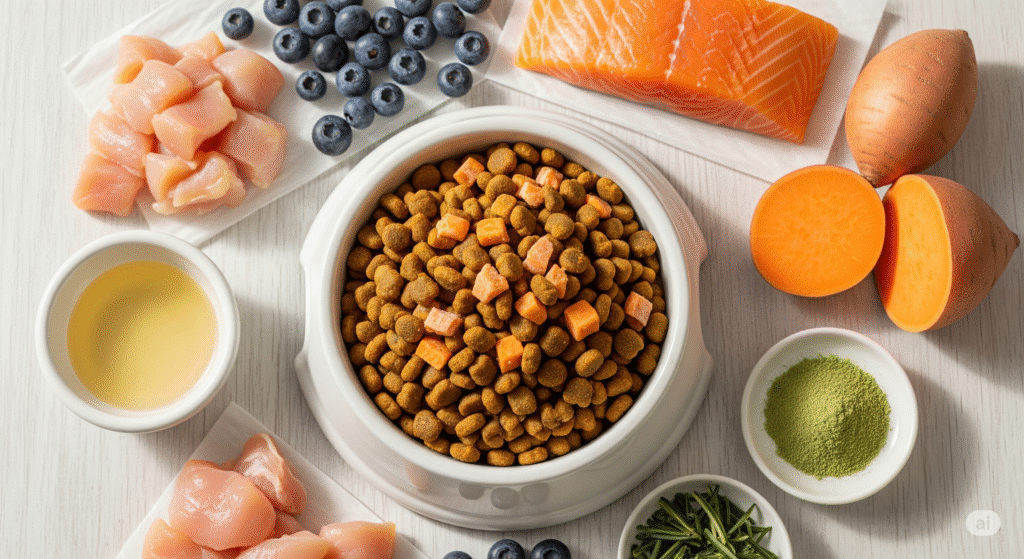
When you bring a new puppy home, one of the biggest responsibilities you take on is ensuring they grow into a healthy and strong adult dog. Proper nutrition plays a major role in this process. Beyond supporting overall growth, the food you choose for your puppy also impacts long-term joint health. Strong bones and flexible joints are essential for active play, exercise, and preventing future health issues like arthritis or hip dysplasia.
In this guide, we’ll look at the best food options for puppy growth and joint health support, along with key nutrients you should watch out for.
Why Joint Health Matters for Puppies
Puppies grow at a rapid rate, especially during their first year. During this period, their bones, muscles, and joints are still developing. If they don’t get the right balance of nutrients, they may face issues such as:
- Improper bone development
- Weak cartilage leading to stiffness
- Increased risk of hip or elbow dysplasia in large breeds
- Joint pain as they grow older
Focusing on joint health early in life means your puppy has a better chance at living an active, pain-free adulthood.
Key Nutrients That Support Growth and Joints
- Protein – Builds muscles and supports tissue repair. Look for real meat like chicken, lamb, or fish as the first ingredient.
- Calcium and Phosphorus – Crucial for strong bones and skeletal development.
- Glucosamine and Chondroitin – Naturally occurring compounds that support cartilage and joint cushioning.
- DHA and Omega-3 Fatty Acids – Found in fish oil, these nutrients support both brain development and joint flexibility.
- Antioxidants – Vitamins C and E help reduce inflammation that can damage growing joints.
Best Types of Puppy Food for Growth and Joint Health
1. High-Quality Dry Puppy Kibble
Choose puppy-specific kibble made for your dog’s breed size. Large breed puppies, for example, need special formulas that balance calcium and phosphorus to avoid overly rapid bone growth. Look for kibble that includes fish oil or added glucosamine.
2. Wet Puppy Food with Added Nutrients
Wet food can be a tasty option, especially for picky eaters. Some brands include added omega-3 fatty acids and joint-supporting supplements. Ensure the label mentions balanced nutrients for growth.
3. Fresh or Raw Diets
Brands like The Farmer’s Dog or fresh-frozen raw diets provide real, whole ingredients. These often contain natural sources of glucosamine such as beef trachea or chicken feet, along with vegetables rich in antioxidants.
4. Supplements for Extra Joint Care
If your puppy’s food does not contain joint-supporting compounds, your vet may recommend supplements. Glucosamine, chondroitin, and fish oil supplements can give an extra boost, especially for breeds prone to joint issues like German Shepherds, Labradors, or Golden Retrievers.
Feeding Tips to Support Healthy Growth
- Stick to Puppy Formulas: Adult dog food doesn’t contain the extra calories and nutrients puppies need.
- Avoid Overfeeding: Rapid weight gain puts unnecessary pressure on developing joints.
- Choose the Right Portions: Follow your vet’s guidelines or the feeding chart on your puppy food bag.
- Time Meals Properly: Small, frequent meals are better for digestion and steady energy levels.
Homemade Options for Puppy Joint Health
Some puppy parents prefer to make meals at home. If you go this route, always check with your vet to make sure your recipe is balanced. Ingredients to consider include:
- Lean meats like chicken, turkey, or beef for protein
- Salmon or sardines for omega-3 fatty acids
- Cooked eggs for added protein and healthy fats
- Sweet potatoes and carrots for vitamins and antioxidants
- Natural sources of glucosamine such as chicken broth made with bones
Signs of Healthy Growth and Joints in Puppies
You’ll know your puppy’s food is doing its job when you notice:
- Steady, healthy weight gain
- Shiny, soft coat and healthy skin
- Energy for play and training sessions
- No stiffness or limping after exercise
- Strong posture and good mobility
If your puppy shows signs of joint pain or sluggish growth, consult your veterinarian right away for dietary adjustments.
Final Thoughts
Choosing the best food for puppy growth and joint health support sets your pup up for a happy, active life. By focusing on high-quality protein, joint-supporting nutrients like glucosamine, and omega-3 fatty acids, you’re helping your furry friend grow strong bones, flexible joints, and a resilient body.
Your puppy deserves the best start in life—fuel them with food that supports both growth and long-term mobility. 🐾💙 PetsDogPuppy
